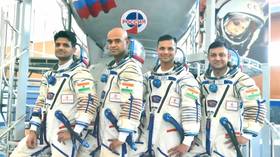Meet the Russian social media queens winning hearts in India
Evgenia, Yulia, and Ekaterina are among the most famous Russians having thousands of fans on Indian social media, as they vlog their lifestyles, work, and the inevitable love affairs with the country
For Russia-born actor, model and producer Evgenia Belskaia, finding a home in India’s tourist-hotspot of Goa was destiny. What was meant to be a week-long trip in 2008 extended to two months, during which time she met her Swedish husband.
“When I first came to Goa, I felt so peaceful and connected with nature as compared to Moscow,” says Belskaia, who enjoys a following of 16,000 followers on Instagram. “I loved the freedom and the untouched beauty of a lot of places here. I fell in love with this life.”
The Susegad lifestyle aside, a quick internet search will find you a number of others like Belskaia in India – Russian by birth but with their hearts and lives in India. These influencers, or digital content creators, arrived in India for various reasons, some to explore a new culture and others for new opportunities, only to find themselves settling in the country sooner rather than later.
“India is where I met my love, where my daughter was born and where I started my business. says Yulia Aslamova, Head of Asia at Direct Response Influence Marketing. “It’s really attractive for tourists, but the world is watching its phenomenal economic growth. I, too, came to India for work opportunities, to discover a new culture and learn more about the growing economy. The first five years were the most challenging, but once I got to know people, improved my English, made good friends, it felt like home.”
Cultural shocks galore
A cursory thought would draw few similarities between India and Russia. India is a vastly varying multicultural nation. Their cuisines are poles apart, as are the number of languages spoken. However, it’s quite the difference between handling such dissimilarities for a short span of time as a tourist and adapting to an entirely new sense of social etiquette, personal space, work ethic, familial values and other such national traits on settling in a new country.
“There were many things that came as a cultural shock initially. The food, the dressing, the traditions and ways to show respect to others… There are so many things different from how they are done in Russia. But I was able to adapt pretty quickly, and they came naturally to me after a while,” says Aslamova, who has roughly 15,000 followers across Instagram, LinkedIn and Twitter.
However, for someone trying to set up a business and expand her network, it took Aslamova a little longer to acclimatize to the approach to work in India. She explains: “Russians have a very direct, straightforward approach while doing business, but in India, it’s diplomacy that works and being able to negotiate by being both assertive and gentle. Other aspects like the cultural codes and work ethics are not as obvious but do have a huge impact on your work, as well.”
For Ekaterina Raman, a fashion blogger with more than 181k Instagram followers (she lives in Madhya Pradesh with her Indian husband), there were many disorienting moments that often made her feel like she wouldn’t be able to handle living in India.
“Like touching the feet of relatives (I stopped doing that a while back and only do it by choice, perhaps with gurus); the need to wear a mangalsutra and other things that come with being a married woman (but nothing for a man); and wearing traditional clothes like saris or kurtis on a daily basis…,” she shares. “My father-in-law used to fume when I wore T-shirts and shorts at home, but he got used to it. I must add that I love Indian traditional wear for when I step outside, for travel and occasions, but I can’t wear them 24×7.”
There’s another rather amusing Indian trait that irked Raman — one that Indians across the board can surely relate to.
“Relatives drop by on any random day with their entire family and stay for a week, if not more,” she laughs. “This used to throw me off balance because in Russia, you’re informed about them arriving beforehand. Plus, they always seemed too distantly related for such extended stays.”
It was smoother sailing for Belskaia on her move to India, besides one major adjustment — the spicy food.
“Even when we specify ‘NO spice,’ they still bring you spicy food,” she jests. “But I love Indian culture, and most people kind, helpful and spiritual. “Indians and Russians are very similar in their mentality. We respect traditions, take care of our family and friends, and prefer deeper connections over superficial relationships.”
However, the unwanted attention that foreigners attract in India isn’t news. While ‘Atithi Devo Bhava’ may be the tagline of India’s tourism campaign, the ill-treatment they often face is a known fact. But to Raman, it runs deeper than that.
“Even though I feel 80% like an Indian now, I will most likely never be treated like one because people still see me through the prism of a foreigner. They want to know where I’m from, take a photo with me, or ask me questions,” she says. “It’s weird when I travel around India because people don’t know I’ve lived here for years and feel like a local. So I miss out on being ‘local,’ so to speak.”
Favorites around India
Having lived in India for years – some, for decades – they have all developed a number of favorites across India. Some entirely new, and some a reminder of home. Goa tops the list of preferred travel destinations. Or as Aslamova calls it: “a small Russia.”
“It’s my comfort zone because I can get any Russian dishes, beauty experts and trainers there. I love the beach, the sea and nature all around,” she says. “We finally made a trip to the Andamans last year and plan to revisit soon! Munnar in Kerala is also a must visit. I remember the moment we saw the sunrise from a hilltop…”
For Belskaia, the allure of Goa lies in the “many beautiful restaurants with super tasty food and amazing atmosphere” that have mushroomed in the state. She was also amazed by the history surrounding Rajasthan and Hampi, but it’s a snow-dusted Gulmarg that serves as a poignant reminder of the landscapes back home.
An avid traveler, Raman found peace in Rishikesh, Varanasi (“even though many foreigners find it dirty, I say it has such a unique vibe to it”), Wayanad, Bodh Gaya, Bengaluru, Arunachala Hill in Tamil Nadu, Delhi’s Akshardham Temple, and the world-renowned Sadhguru’s Isha Yoga Centre in Coimbatore.
Finding an audience in India
“The India-Russia relationship is not just about politics, diplomacy or economics; it’s much deeper,” Indian External Affairs Minister S Jaishankar said in December 2023, alluding to the close ties the countries share as “valued, time-tested” partners.
While Jaishankar speaks of amicable relations, the polarity between India and Russia is stark and undeniable on many accounts. Despite this, the following that content creators such as Aslamova, Raman and Belskaia, among many others, enjoy indicates a certain appeal that drives their popularity.
“I believe many similarities exist between our cultures and people’s mindsets. So the Indian audience can easily connect with Russian influencers and share the same values,” Aslamova says. “We are very much alike. It’s the core reason for our strong connection.”
Raman, however, believes the basis is a tad more superficial. She claims: “Many Russian women are naturally attractive, and as the majority of the Indian population is male, some follow them just for their looks.”
“The other reason is the special connection that some Indians feel towards Russia, which goes back to the USSR times,” she adds. “Plus, there are people who read Russian literature, who travelled to Russia for work or education. There are scores of Indian students in major Russian cities; for them, following Russian creators could induce nostalgia over their friends and time in Russia.”
There are a number of other Russian content creators based in India, some more lifestyle or family oriented, some travel influencers, some who are into traditional Indian dance forms, and some spiritually inclined. There’s digital creator Ekaterina Vasilyeva, for instance, who hails from Moscow but is based in Delhi. Russian-Israeli citizen Natalia Golibitskaia, who goes by Nilachala Devi Dasi, is a devout Krishna follower, an ISKCON disciple and leader of the Harinama Sankirtana Team.
“It’s always interesting to see how a foreigner experiences your country and assimilates,” Raman reflects. “There are many non-native content creators in Russia, too. I watch their videos for a different perspective because I want to know the differences between my homeland and theirs, what they like or dislike about the place and how they experience my country.”
Thoughts of home
Homesickness knows no borders. It’s an emotion every individual is familiar with, the longing for the familiar. For these Russian influencers, however, it’s a different story. “India is my home” is the common sentiment they share, no matter how much they miss their home country, family and friends.
“I miss my best friend, my grandmother, food like our dumplings and smetana, my favorite pastries, freshly baked bread, candies and chocolates… I miss the cafés I frequented,” rues Raman. “Most of all, I miss Russian summers. They are pleasant, breezy and not humid, like the weather in Bengaluru.”
But do they have plans to move back? “Never say never,” concludes Aslamova.









Comments are closed.